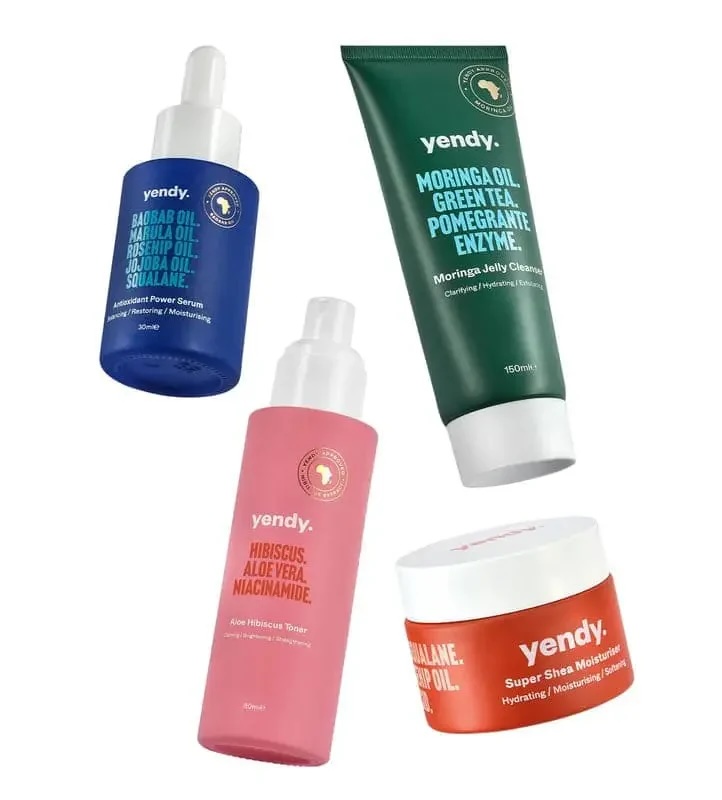
Yendy Skin’s Adobe Advertising Partnership Drives Global Brand Recognition And 300% Sales Growth
Yendy Skin founder Julian Boaitey first discovered the Adobe advertising campaign he stars in had gone live through his friends and family, who blew up his phone with texts that they spotted it on Disney Plus, Netflix, YouTube and billboards all over his hometown of London.
The campaign, which conveys Boaitey’s dream to create a brand to support African farmers that cultivate ingredients for the beauty industry, has also gone live in the United States, where its television commercial is a staple during NBA game breaks. The impact on the brand has been profound. Its sales and email list have spiked 300% and 400%, respectively, from the three months before the campaign started running.
Boaitey says, “We’ve had an opportunity for the brand to now be seen by millions of people around the world, so it’s really just a case of taking that by the horn and trying to grow the brand off the back of that.”
He describes the Adobe campaign as just one element of an “incredibly surreal” period for Yendy. A month prior to it, an Instagram video sharing Boaitey’s founder story—he quit his full-time job to sell shea butter and pay female farmers across northern Ghana better than Yendy’s bigger beauty brand counterparts—went viral, garnering greater traffic than Yendy has had on its social media since its 2021 launch. It’s been viewed by over 750,000 people on its platforms. Combined with the Adobe commercial, it led to the brand selling out in October.
“I knew something was coming, but I didn’t know what it was going to be or how big, so we were very much ill prepared,” says Boaitey. “It’s been pretty manic.”
Yendy restocked its African ingredient-driven products a few weeks later—its assortment includes $44 Super Shea Moisturiser, $39 Antioxidant Power Serum, $29 Aloe Hibiscus Toner and $34 Moringa Jelly Cleanser—but Boaity anticipates they’ll be sold out again by the end of this month. Adobe plans to keep airing the commercial featuring him. The software company ran across Boaitey through a competition it held last year in partnership with Enterprise Nation that he won. He scored 4,000 pounds or roughly $5,000 from the win.
Yendy is an outgrowth of The Good Butter Company, a subscription box service centered on fair-trade African superfood products that Boaitey introduced in 2018. When he realized the box wasn’t a scalable business and failed to establish product-market fit, he participated in startup accelerator Impact Central and transformed the company into Yendy. Boaitey has poured 250,000 pounds or roughly $314,000 into the brand from his personal savings, grants and angel investment.
Boaitey acknowledges Yendy’s mission to spotlight small-scale female farmers in Sub-Saharan Africa and bring their ingredients to the beauty industry isn’t novel. However, he points out what’s different about Yendy is its messenger. Boaitey says, “We’ve seen quite a few brands tackle, or at least say they’re tackling, the issue around fair sourcing, ingredient-led supply chain transparency, but, in the U.K., it had never been a story that has been told specifically by an African.”
Prior to the Adobe campaign, Yendy’s marketing largely concentrated on the women responsible for the ingredients in its products. However, last year, the brand began to shift to founder-led content, and it was a fruitful move. Still, the female farmers haven’t vanished from its marketing. In January, Yendy launched the #PayAuntieWell campaign in partnership with Happy Town Project to celebrate contributions of African women and advocate for fair pay. The campaign sparked another viral moment.

“What’s even better than showing the faces of the farming partners that we work with is actually showing the founder of the brand on the ground with the women who make the raw ingredients,” says Boaitey, adding, “I was already spending quite a lot of time on the ground across Sub-Saharan Africa and Ghana in particular working with the farmers and we’ve set up a foundation to work with the farmers in addition to sourcing ingredients from them as well. So, the relationship was already there, it was more of a case of making sure that the camera didn’t come off.”
Yendy is available in direct-to-consumer distribution in the United States and the U.K. About 35% of its customers are American. The brand was previously carried by Sephora UK as part of the retailer’s drop-ship program, but left last year when drop-shipping was dropped. Partly in an effort to attract retailers, it expects to expand its assortment with more African ingredients and is busy shoring up its supply chain to rectify stockouts.
Boaitey says retailers have been fans of Yendy, but are interested in its product range increasing to be able to fill their shelves. For consumers who’ve seen the brand in Adobe’s campaign, he continues, they “may want to buy our products, but they need to trust your brand. So, to have the cosign by Adobe and to see us on television really legitimizes the brand and same with being stocked with Sephora.”





Leave a Reply
You must be logged in to post a comment.